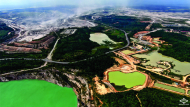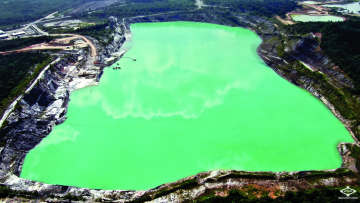Adaro’s coal spin-off: growing a climate conscience or simple greenwashing?
Camilla Perotti, Banks and Coal Campaigner at BankTrack | +31 (0)6 18283440
Apekshita Varshney, Climate Finance Campaigner at Ekō

Camilla Perotti, Banks and Coal Campaigner at BankTrack | +31 (0)6 18283440
Apekshita Varshney, Climate Finance Campaigner at Ekō
Adaro Energy Indonesia is feeling the pressure of the energy transition. Its recent plan to divest its thermal coal arm through a public offering indicates a growing struggle to finance its coal activities. Adaro is the world’s sixth-largest coal miner, with 83% of its revenue coming from its coal mining operations and coal power business.
Last month, Adaro did not refinance its $750-million bond. This potentially indicates a reaction to market conditions and a sign that the company’s continued coal expansion and mounting environmental and human rights controversies have become too risky for banks and investors to ignore. Major players including Hyundai, BNP Paribas, Standard Chartered, DBS, and Deutsche Bank recently distanced themselves from Adaro, signalling growing distrust from investors and steel buyers in coal companies with inadequate transition plans.
Another clue that Adaro is feeling the pressure is its recent decision to sell 99.99% of its shares in its subsidiary PT Adaro Andalan Indonesia, its thermal coal business unit. This shows how Adaro is desperately trying to remain competitive in a transitioning world and, with a smaller percentage of revenue being tied to coal, become attractive to a large and more climate-conscious investor base.
The truth, however, is that this sale is not going to stop Adaro’s involvement with coal: far from it, they remain heavily invested in dodgy deals. Its metallurgical coal (met coal) business is quickly expanding, next to captive coal power generation projects like the controversial North Kalimantan smelter plant. In 2023, Adaro increased its met coal production by 52% over that of 2022 and the company plans to steeply grow it in the future. The North Kalimantan project itself had already caused financial trouble for Adaro, which reportedly struggled to collect the US$2 billion necessary for the first phase of development, after major global banks including DBS, OCBC, and Standard Chartered ruled out financing the project. The project finally achieved financial closure only once major Indonesian and regional banks, such as Bank Mandiri, Bank Negara Indonesia, and Bank Rakyat Indonesia, stepped in.
The controversies surrounding Adaro include environmental disasters, community displacements and accusations of greenwashing—all of which have fuelled public outcry and established the Indonesian coal miner as a financial and reputational liability.
RECAP: Adaro’s record of environmental destruction and human rights abuses
In 2021, Adaro’s coal mining expansion in South Kalimantan was linked to catastrophic flooding in the region. Adaro’s coal mining activities are also directly linked to turning the thriving Wonorejo village in South Kalimantan into a ghost village. Local communities reported Adaro employing intimidation tactics to silence opposition, deepening the company’s negative public image.
The greenwashing backlash
In 2023, Adaro unveiled its plan to build a coal-fired power plant to supply energy to a massive aluminium smelter in North Kalimantan. Initially marketed as a "green" initiative, the project quickly backfired. This power plant is expected to cause soil and freshwater pollution, along with a host of other environmental issues, that could disrupt the livelihoods of local fishermen and communities and disturb local ecosystems. At the company’s Annual General Meeting in 2023, a group of Indonesian shareholders took a stand against Adaro, calling out the company’s greenwashing. They accused the company of misleading the public by branding a polluting coal-fired power plant as part of its efforts to transition to cleaner energy. This incident sparked a viral backlash on social media, with environmentalists and activists raising their voices to decry Adaro’s attempts to deceive the public.
The controversy grew larger when Hyundai, the global automaker, entered into a deal with Adaro to purchase aluminium from the smelter powered by the coal plant. Fans of the K-pop group BTS, mobilised by the environmental activist group KPOP4PLANET, led a petition demanding Hyundai cancel the deal. With more than 11,000 signatures and increasing public pressure, Hyundai caved, ultimately terminating its agreement with Adaro.
Rainforest destruction and Indigenous Peoples’ displacement
Indonesia’s Kalimantan region also includes some of the world’s most biodiverse ecosystems and rainforests. The region, home to rare orangutans and rich rainforest habitats, and several Indigenous groups including the Dayak community, is threatened by Adaro’s coal expansion. Recent research commissioned by corporate accountability group Ekō and conducted by WALHI also exposed Adaro’s mining activity outside government-mandated concession areas and violations of environmental regulations in South Kalimantan.
For years, Adaro has pressed forward with its plans, apparently unfazed by the growing chorus of dissent from environmental groups and local communities. However, new developments including Adaro’s choice not to refinance its bond and news of its coal spin-off signal eroding investor trust in the company.
The coal spin-off: a financial trick?
Adaro’s latest plan to sell its thermal coal business, PT Adaro Andalan Indonesia (AAI), through a public offering might be seen as part of the company’s efforts to reposition itself as a greener, more sustainable business, with plans to focus on decarbonisation and emissions reductions.
However, questions around whether this is a sincere shift or simply a restructuring manoeuvre to access international finance remain. Adaro’s inability to secure financing for its ongoing coal operations has already made it clear that international investors are no longer willing to back its dirty coal business. But other concerns remain: will this move truly mark a pivot toward a more responsible, sustainable future for Adaro? Or is the spin-off an attempt to profit from coal in a less direct way, like other major coal miners, such as Adani and Glencore, have done before? If Adaro’s strategy is, indeed, a true step toward emissions reduction, we would expect to see Adaro commit to making sure AAI’s new owners themselves have a strong decarbonisation strategy. However, the company has not made any such commitment. There is a pressing fear that Adaro is simply dumping its assets without a clear retirement and rehabilitation plan, and, as a result, harm to Indigenous and other communities will continue under new ownership.
A critical turning point
Adaro’s decisions not to refinance its US$750-million bond and to attempt to sell off its coal unit represent a critical turning point in the company’s long and controversial history. This financial setback—along with its inability to shake off the mounting concerns about its environmental and social record—establishes, once again, coal’s reputation as the dirtiest fossil fuel with a fast-diminishing pool of investors.
As Adaro’s spin-off story plays off, investors and financial institutions are cautioned that continuing to support coal mining companies will expose them to severe reputational risks, public backlash, and growing financial uncertainty. It’s about time for financiers to understand that financing Adaro means financing a dodgy deal, and divest accordingly.


